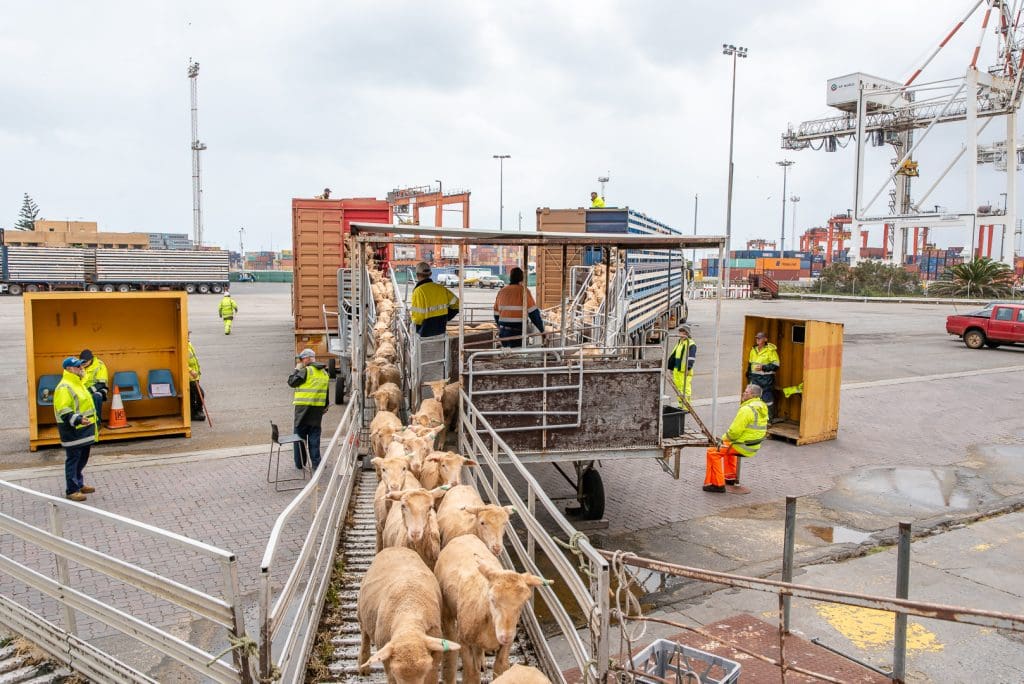

Sheep being loaded onto a vessel. Picture: The Livestock Collective
LET’S strip again the political rhetoric and activist hype and take a chilly, arduous have a look at the stay sheep export commerce.
In its heyday, within the Nineteen Eighties and 90s, there have been 10-12 giant livestock carriers (70,000-110,000 sheep per ship) shuttling backwards and forwards delivering sheep from Australia to the Center East. The sheep had been largely mature, heavy Merino wethers on the finish of their productive life as wool producers.
Reside export offered an outlet for surplus sheep at a time when the nationwide sheep flock was steadily declining attributable to sustained low wool costs, with the Wool Reserve Value Scheme beneath pressure after which collapsing.
After unloading abroad, our sheep had been a staple meals for the tens of millions of south Asian visitor employees employed on development initiatives within the Arabian Gulf States. Australian recent mutton was the most cost effective pink meat protein out there. The stay export commerce was a win-win for each Australian sheep producers and low-income Center East customers.
On the time, a shipboard mortality price of lower than 2%, with solely an occasional mortality catastrophe, was thought-about OK. Animal welfare activism was in its infancy and slaughter procedures different from primary to downright medieval. How instances have modified!
Exporting livestock by sea to the Center East is an inherently dangerous enterprise. Through the years Australian governments of each political persuasions have applied a raft of measures to handle these dangers. These modifications have offered main animal welfare advantages. Shipboard mortality charges are actually persistently very low and there hasn’t been a reportable incident (shipboard mortality greater than 1pc) since 2017.
Nevertheless, the danger administration procedures wanted to fulfill neighborhood expectations of the commerce have come at nice business value.
ESCAS
In 2011, 4 Corners aired ‘A bloody enterprise’ – an explosive exposé of merciless slaughter practices for Australian cattle in Indonesia. This led to the Exporter Provide Chain Assurance Scheme (ESCAS). ESCAS requires livestock exporters to make sure humane dealing with and slaughter of Australian feeder and slaughter animals within the importing nation. Exporters are anticipated to have the ability to hint the situation of the sheep they export all through the availability chain, from unloading abroad to slaughter at an accepted abattoir.
ESCAS has enhanced the welfare of Australian sheep after arrival within the Center East, with the tip of yard killing, facility upgrades and animal welfare coaching of feedlot and abattoir workers. With no direct regulatory oversight from Australia and a heavy reliance on third-party audits, there’s loads of scope for gaming the system, however the internet impact of ESCAS continues to be clearly animal welfare optimistic. Nevertheless, ESCAS can also be a major business obstacle and price. Australian sheep can solely be exported to an accepted holding facility, for slaughter at an accepted abattoir – they can’t be exported to or on-sold to native merchants. There may be an preliminary value of getting amenities ESCAS accredited, plus the continued prices of information recording, reporting and audits. In some instances there’s additionally a lingering resentment of being informed by Australia how a livestock enterprise abroad have to be managed.
Australia is the one nation on the planet with a regulatory system comparable to ESCAS. Sheep from different nations may be freely offered to whoever the exporter needs, to be slaughtered wherever the client needs, with no traceability or efficiency necessities, no knowledge assortment and no auditing.
Center East summer season blackout
In 2018, 4 Corners aired one other explosive stay export exposé, with whistleblower footage from 5 voyages on the Awassi Specific, together with a voyage in August 2017 when about 2,400 sheep died from warmth stress. Group outrage adopted. In response, the Australian Livestock Exporters’ Council proposed a three-month northern hemisphere summer season blackout, when sheep wouldn’t be exported to the Center East. This was a game-changer that allowed the trade to proceed when it would in any other case have been closed down. It additionally produced a quantum enchancment in animal welfare. Just about all of the catastrophic mortality occasions over time have been a results of warmth stress in the course of the Center East summer season.
A Center East summer season blackout has since been locked into stay export regulatory necessities, albeit with some tweaking of dates, adjusted stocking density allowances and differentiation between ports within the Arabian Gulf, Arabian Sea and Purple Sea.
While the Center East blackout interval has had a useful welfare impact, the business implications for Australian exporters are little in need of disastrous. Think about a livestock exporter with an enormous funding in amenities and workers, however not allowed to function for 3 months of the yr. Or an importer whose sheep provide chain is reduce off for 3 months annually, together with in recent times the interval of peak demand at Eid-al-Adha. And ship house owners can not merely park their vessels for 3 months ready for sheep exports to renew from Australia – they have to actively search for different constitution alternatives and foster commerce preparations elsewhere.
Not one of the different nations supplying stay sheep to the Center East has a summer season blackout interval. They will provide sheep year-round as and when the market calls for.
Single-tier sheep pens
The Australian Maritime Security Authority (AMSA) is accountable for regulating the operation of ships in Australian waters. AMSA Marine Orders Pt 43 units out the necessities for livestock vessels. It’s extensively considered the worldwide gold customary for livestock delivery.
AMSA Marine Orders Pt 43 features a ban on using multi-tiered sheep pens. It got here into impact on 1 January 2020. It additional improved animal welfare, however with main business penalties. A ship’s deck that might beforehand have two tiers of sheep pens is now solely allowed a single tier. It’s a lot simpler to handle and observe sheep in single tier than double-deck pens. However most significantly, air flow is a lot better with air movement throughout a pen with flooring to ceiling head house.
Additionally, with solely half the variety of sheep per sq. meter of deck house, there’s solely half the quantity of physique warmth to be dispersed – so lowered threat of warmth stress. The draw back is that the carrying capability on a ship that may in any other case have had multi-tier pens was tremendously lowered. Think about trucking sheep in double-deck cattle crates reasonably than four-deck sheep crates.
Not one of the different nations supplying sheep to the Center East mandates using single tier pens. The fleet of small to medium dimension livestock ships that ply the Mediterranean, Purple Sea and Arabian Gulf are usually configured to load as many sheep as doable, with ship stability the one actual constraint.
Vets and Impartial Observers on ships
The Australian authorities requires an Australian vet on all livestock ships to the Center East. Ships may be required to have an Australian authorities observer on board. The prices of using a vet and authorities observer for 3-4 weeks, then flying them residence are borne by the exporter. No different nation supplying stay sheep to the Center East requires a vet or authorities observer on board, so competing suppliers don’t have this restriction and price.
Shrinking fleet
A significant drawback confronting the commerce now’s a scarcity of appropriate ships. The fleet of ships appropriate for the stay sheep commerce has steadily declined over the past twenty years, with virtually no funding in new delivery. Ship house owners have seen the writing on the wall and haven’t been keen to take a position the tens of tens of millions of {dollars} required for a brand new ship to service a dying commerce.
Since 1 January 2020, modifications to the fleet of livestock ships appropriate for the commerce and accredited to load in Australia embrace:
- 4 giant livestock ships have relocated to the Atlantic, to see out their later years crusing from South America to the Center East and Turkey. These vessels won’t return to Australia, because the ship house owners haven’t been keen to do the structural upgrades and upkeep required for the vessel to take care of AMSA accreditation.
- Two medium dimension livestock ships have been scrapped.
- The Gulf Livestock 1 sank off Japan.
- Two medium dimension livestock ships are owned by Israeli pursuits and are usually not prone to return to Australia till threats to Israeli delivery within the Purple Sea and Mediterranean calm down.
Throughout the identical time no new livestock ships appropriate for the Center East sheep commerce have come on-line. There’s a lengthy lead time to assemble a brand new livestock ship to Australian requirements. I’m not conscious of any such vessels beneath development.
There are at present two medium dimension livestock carriers on the Australia – Center East run. They will carry about 20,000 sheep every. Given the fastened prices concerned, it’s troublesome to see how such a small cargo of slaughter sheep may very well be commercially sustainable on a long-haul voyage to the Center East.
A big livestock provider that’s engaged within the Atlantic however nonetheless has AMSA accreditation would possibly return to Australia in early 2025. One other giant livestock provider has been in China for a number of months for repairs and upkeep and can seemingly return to load in Australia within the New Yr. It’s a very previous ship (44 years previous) and already on borrowed time. At greatest, it may very well be anticipated to hold in till Could 2028.
The present fleet is a shadow of what it was.
What does the long run maintain?
The stay sheep commerce has been crusing right into a business headwind for a few years – the tyranny of distance from market, incapability to produce year-round, animal welfare pressures, regulatory constraints and prices, regional hostilities and now additionally a scarcity of delivery.
Legislative change is required to overturn the stay sheep export ban. It’s doable however would require a future authorities to get majority assist in each homes of parliament – an enormous ask.
Winding again the animal welfare measures which have considerably lowered shipboard mortalities and improved animal welfare abroad however positioned Australian exporters at nice business drawback – is a much bigger hill to climb.
Convincing ship house owners to take a position the tons of of tens of millions of {dollars} required to construct a brand new fleet of huge livestock vessels that meet AMSA requirements, to service an trade in its loss of life throws – nicely, good luck with that one.
No quantity of political posturing or farming neighborhood advocacy goes to vary these fundamentals. There isn’t a real looking prospect of a viable stay sheep export commerce after 1 Could 2028. Time to maneuver on.
- Writer Tony Brightling is an Australian veterinarian who has labored with the stay export commerce for greater than 30 years as an trade consultant resident within the Center East, livestock exporter, veterinarian and trade marketing consultant.
Trending Merchandise










